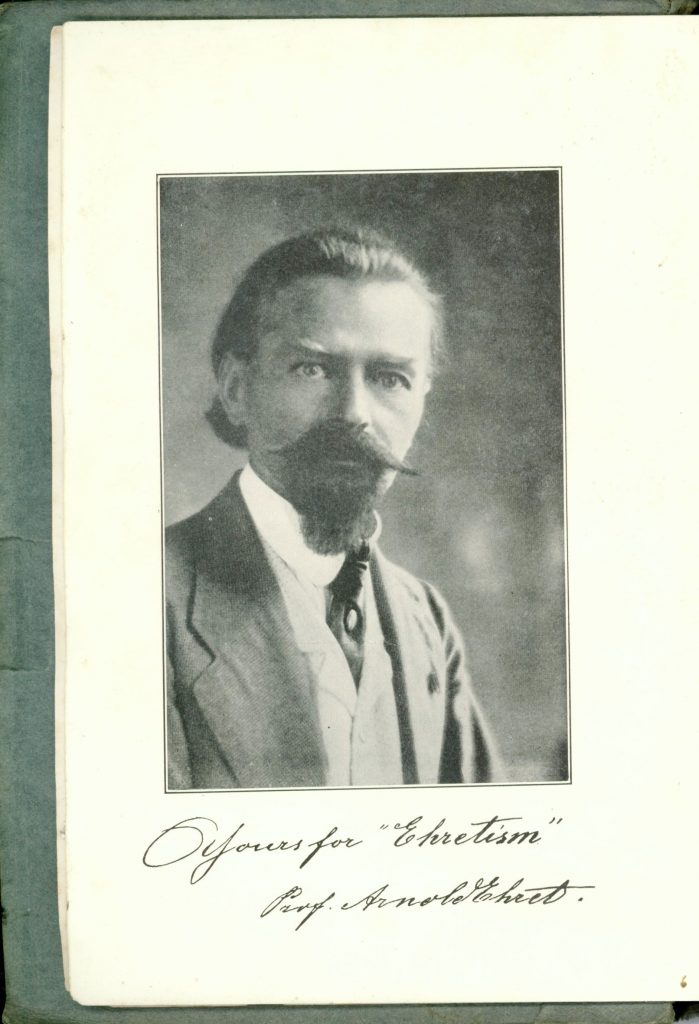Articles, Writings about Arnold Ehret
Who is Prof. Arnold Ehret?
The following Biography of Prof. Arnold Ehret is an excerpt from the Mucusless Diet Healing System: Annotated, Revised, and Edited by Prof. Spira:
Biographical Sketch of Prof. Arnold Ehret by Prof. Spira
Professor Arnold Ehret was a German healer, dietitian, philosopher, teacher, visionary, and one of the first people to advocate fasting and a plant-based, vegan, and mucus-free lifestyle as a therapy for healing. For over 100 years, his written works and teachings have touched the lives of thousands of health-seekers pursuing higher levels of vitality. Ehret’s most famous books, Mucusless Diet Healing System and Rational Fasting, continue to increase in popularity as plant-based, vegan, and raw-food diets become more prevalent. Ehret believed that pus- and mucus-forming foods were unnatural for humans to eat, and suggested that a diet of fruits and green leafy vegetables (i.e., mucus-free foods), are the most healing and powerful foods for humans. Ehret offers a sophisticated yet simple and safe transitional system for those who endeavor to stop eating pus- and mucus-forming foods.
Early Life
Arnold Ehret was born July 29, 1866, near Freiburg, in Baden, Germany. His father was a gifted farmer who was so technologically advanced that he crafted all of his own farming equipment. Like his father, Ehret would be endowed with a passion for studying the cause and effect of phenomena. His courses of interest were physics, chemistry, drawing, and painting. He also had an affinity for linguistics and could speak German, French, Italian, and English.
At the age of 21, he graduated as a professor of drawing and was drafted into the military only to be discharged because of heart trouble. At the age of 31, he was diagnosed with Bright’s disease (inflammation of the kidneys) and pronounced incurable by 24 of Europe’s most respected doctors. He then explored natural healing and visited sanitariums to learn holistic methods and philosophies. In a desperate attempt to quench his misery, Ehret decided to stop eating. To his amazement, he did not die but gained strength and vitality.
In 1899, he traveled to Berlin to study vegetarianism, followed by a trip to Algiers in northern Africa where he experimented with fasting and fruit dieting. Due to his new lifestyle, Ehret completely cured himself of all of his diseases and could then perform great feats of physiological strength, including an 800-mile bicycle trip from Algiers to Tunis. His discovery caused him to posit that pus- and mucus-forming foods are the fundamental cause for all human illness, and that fasting (simply eating less) is Nature’s primary method of cleansing the body of the effects of unnatural eating.
Successful Healer
In the early 1900s, Ehret opened a hugely popular sanitarium in Ascona, Switzerland where he treated and cured thousands of patients considered incurable by the so-called “medical authorities.” During the latter part of the decade, Ehret engaged in a series of fasts monitored by German and Swiss officials. Within a period of 14 months, Ehret completed one fast of 21 days, one of 24 days, one of 32 days, and one of 49 days, which stood as a world record for many years. Ultimately, Ehret became one of the most in-demand health lecturers, journalists, and educators in Europe, saving the lives of thousands of people.
On June 27, 1914, just before World War I, Ehret left from Bremen for the United States to see the Panama Exposition and sample the fruits of the continent. He found his way to California, which was of special interest to him. This was because the region was undergoing a horticultural renaissance due to botanists like Luther Burbank, who later paid tribute to Ehret. At the time, the University of California, Riverside also owned the world’s largest collection of rare fruits. When the war prevented Ehret from returning to Germany, he settled in Mount Washington (Los Angeles), where he prepared his manuscripts and diplomas in his cultivated eating gardens. He and other “Back to Naturists” began to influence local populations of young people to investigate plant-based, natural living.
Benedict Lust, a student of Ehret’s and early proponent of naturopathy, initially distributed the English-language books of Ehret, Kneipp, Kuhne, Just, and Engelhardt in the United States. This included Ehret’s Kranke Menschen (literally, sick human beings) which became a best seller. Ehret worked at Lust’s Yungborn Sanitarium for 5 years. Then, Ehret opened his own sanitarium in Alhambra, California before a lecture tour. His course on the Mucusless Diet Healing System became a book of 25 lessons for his students. The book, along with Rational Fasting, became his most important and popular publications. Ehret also developed and marketed his popular Innerclean Herbal Laxative formula.
Death
On October 9, 1922, just 2 weeks after he completed the Mucusless Diet Healing System, he finished a series of four lectures on regaining health through fasting and the “Grape Cure” (grape and grape juice fasting) at the Assembly Room of the Angelus Hotel on 4th and Spring Streets, where it was reported that over a hundred persons were unable to find seats. After leaving the building, between 11:00 p.m. and 11:30 p.m., Ehret, aged 56, fell and sustained a fatal blow to his skull. According to Ehret’s business partner and publisher, Fred S. Hirsch, DNS, he was walking briskly on a wet, oil-soaked street during foggy conditions when he slipped on the curb and fell backward onto his head. Hirsch did not actually witness the fall but found Ehret lying on the street. Carl Kuhn, Ehret’s German publisher during the 1920s, even questioned whether Ehret’s fall was really an accident. Benedict Lust maintained that Ehret was wearing his first pair of new dress shoes and slipped as a result of his unfamiliarity with the footwear.
To this day, the true nature of Ehret’s death raises suspicion among his followers. Ehret’s powerful healing successes along with his influential and revolutionary new lifestyle threatened the medical, meat, and dairy industries. Due to these factors, many believe that foul play was involved in Ehret’s untimely death. His writings on religion and family were also considered quite controversial. In the decades following Ehret’s death, Fred Hirsch had many legal battles with medical authorities over the word “mucus” and the Innerclean laxative.
Legacy
Arnold Ehret is a cultural icon and was an important protagonist of the emerging back-to-nature renaissance in Germany and Switzerland during the latter part of the nineteenth century. The influence of this renaissance spread to America and influenced many counter-cultural movements including the beat generation, the vegetarian-driven “hippie” movement, veganism, and fruitarianism. Throughout the twentieth century, Ehret’s teachings have thrived and developed through the sincere efforts of a small group of dedicated Ehretists. Today, Ehret’s teachings are gaining wider acceptance throughout the world as more people seek to investigate plant-based, vegan healing and detoxification.
-Prof. Spira, June 2013



i’ve been a Ehret follower for 39 years, there’s not a day that goes by that i don’t think of him, to he was a god always will be. i once fasted 51 days and worked every day driving a large school bus i got stronger as the fast went on, i’ve always been a truth seeker and when i purchased his book Rational Fasting i knew i found the truth i will go to my grave with his truths! i went to hall of records in Los Angles and saw the copy of his death certificate!